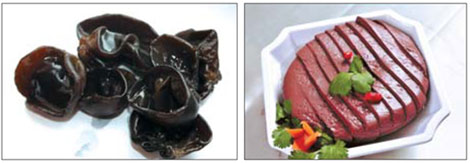Food helps to resist pollution?

On Jan 9, when smog began to enshroud cities in China, a post suddenly went viral on Sina Weibo, a popular micro-blogging platform in China.
Written in a funny style by a netizen identified as a Traditional Chinese Medicine food therapy specialist in Guangdong province, the post advises people to eat black fungus and coagulated pig blood to protect themselves against the negative effects of particles in the polluted air.
So far, the "TCM" post has been reposted nearly 2,000 times, and received hundreds of comments.
Some people said they would follow, while others laughed at the advice. Yet many asked for a scientific explanation of this advice so they could decide whether or not to follow it.
In China, black fungus (or "wood ear") and pig blood (black pudding) have long been considered as body cleansers. Therefore, many people conclude the two kinds of food can help get rid of particles invading the human body, when smog lingers where they live.
Zhang Shu'nan, a TCM chief physician of respiratory diseases with Beijing's China-Japan Friendship Hospital, says the belief is groundless.
"It is nonsense that a specific food can clear dust out of a human body," Zhang says.
"It is far less efficient than a mask."
Zheng Kunyang, a Beijing-based nutritionist with Amway, agrees.
"Wood ear has a lot of nutrients beneficial to the human body, but I cannot say it can clear dust from the respiratory tract, or that it can benefit the respiratory tract," Zheng says.
Wood ear is rich in soluble fibers, and is able to detoxify and boost digestion. To some extent, it helps the blood circulation and metabolism, but that is different from clearing particles from the body, Zheng says.
He says pig blood is a good source of iron, and is advisable for people with anemia, but it has nothing to do with cleansing the body.
Another issue, Zheng says: He doesn't eat such products, because of a lack of reliable suppliers.
"On such smoggy days, what matters is not what you eat, but a sustained balanced diet with enough fruits and vegetables," Zheng says.
From a nutritionist's view, the human body's respiratory tract is in constant contact with the outside world, and virus, toxins and other particles in the air are able to harm the tract through oxidizing the cells and tissues.
To minimize these negative effects, it is important to ingest nutrients that make the respiratory tract less vulnerable to oxidation - in other words, to have food rich in antioxidants, such as vegetables and fruits, not just edible fungus, he explains.
"A diet with variously colored food is most advisable for health, no matter when and where," Zheng says.
























